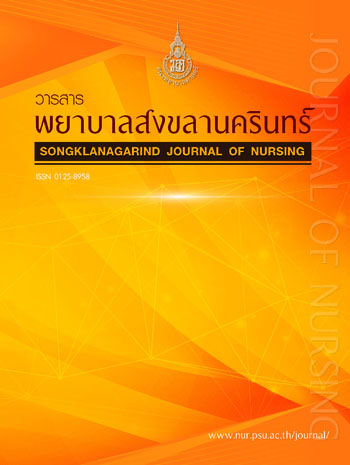Acute Exacerbation Symptoms Among Patients with Chronic Obstructive Pulmonary Disease, Triggering Factors, and Management Strategies
Main Article Content
Abstract
This descriptive study aimed to explore acute exacerbation symptoms among patients with chronic obstructive pulmonary disease (COPD), triggering factors, and management strategies. A total of 115 patients with COPD who were admitted to Thasala Hospital or experienced acute exacerbation symptoms during the last one week were participated, using a purposive sampling technique. The research instrument, developed by the researcher, was questionnaires related to the perceptions of acute exacerbation symptoms in patients with
COPD, the triggering factors, and management strategies. The content validity of the questionnaires was approved by five experts, and test for readable and undersatandable of the questionnaire with five patients with COPD who were similar to the target participants. Data were analyzed using descriptive statistics and content analysis. The results showed that the participants perceived acute exacerbation symptoms, i.e., deteriorated dyspnea/hard time breathing (99.1%). The strategies used to manage acute exacerbation symptoms were selfmanagement with non-pharmacological methods and management by others (100%), followed by using pharmacological methods (98.3%). According to the non-pharmacological method, the results showed that most participants came to the hospital immediately after acute exacerbations (92.2%), followed by taking a rest/stopping activities immediately (89.6%). The triggering factors perceived by participants included an infection of the upper airways and the environmental pollution (100%). The strategies used to manage the
infection of the upper airways included drinking much water when coughing and having secretion (92.2%). For environmental pollution, most participants kept their houses tidy and clean, free from dust (91.3%).The results of this study are beneficial for healthcare providers in order to manage acute exacerbation symptoms and triggering factors in patients with COPD and their relatives.


